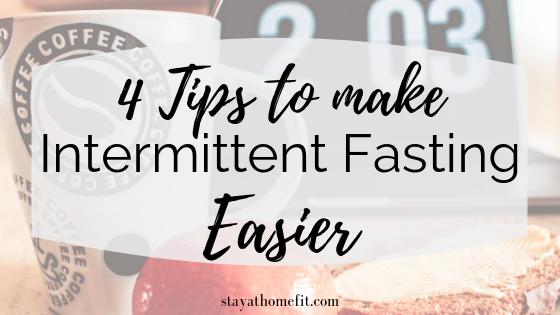Have you heard the fuss about intermittent fasting? Maybe this latest weight loss fad sounds too good to be true, or maybe too hard to be realistic? These 4 tips to make intermittent fasting easier might make a difference…

Well, if you’re not sure what exactly intermittent fasting is, read this post. It gives an overview of what it is and provides links to resources that offer more evidence. There are different ways to do it, but my approach is the 8-hour eating window- I try to eat within an 8-hour time period each day.
I was a skeptic for years, so if you’re skeptical I get it. But I’ve also seen what intermittent fasting has done for my husband and there are lots of things I like about it.
I’m also a former “I could never do that” person. I used to wake up hungry and thought it would be too hard for me to go so long without eating. I was afraid I’d get shaky and not feel great. But done properly the transition isn’t that hard. These tips make it easier.
If you’re already practicing intermittent fasting or if you’re considering it, here are some helpful tips…
4 Tips to Make Intermittent Fasting Easier:
- Start slowly. If you’re just getting started, take it slow. You can gradually push back the time you eat. If you usually eat breakfast, try eating it a half hour later for a few days. Then increase the time.
- Eat a serving of healthy fats with your first meal to help you feel more satisfied. My biggest problem with intermittent fasting is feeling the need to gorge myself at my first meal. A way to slow this down is to make the first thing you eat very satisfying. Try a handful of nuts while you’re fixing your meal or some avocado. I might have guacamole and peppers to fill me up so I’m less likely to go overboard with the rest of my meal.
- Be flexible. Part of the beauty of intermittent fasting is that it’s flexible. Invited out to breakfast with a friend? Have breakfast early that day. Every day doesn’t have to look exactly the same. Try to keep your window of eating around the same amount of hours, but you can eat later or earlier when you have stuff going on.
- Drink water, coffee, tea. Drinking definitely helps keep hunger at bay. I’m not saying load up on coffee and make yourself jittery and nauseous, but drinking lots of water with a few cups of coffee and tea can make mornings easier. It can be regular or decaf. I have one cup of coffee with coconut oil late in the morning, too. My husband would add that you should make get in the habit of making yourself a good cup of coffee. We switched to using a French press (see this post for more on that and other kitchen items I love) and we buy coffee we love.
Intermittent Fasting and Weight Loss
I’m not making any promises for weight loss. This post is based on my experience with intermittent fasting, which is ongoing. My primary motivation for doing it is the amazing benefits for your health. I’ve learned a lot about it and I think the evidence that it’s good for you is pretty convincing. I will admit that I need to lose about 10 pounds and I’m hoping that over time this will help me do that!
I think the weight loss thing is different for everybody. It might depend on gender, body composition, activity level, length of time you’ve been fasting, hormones. I haven’t seen great weight loss results myself, but I have seen women have success with it.
When I’m considering doing something with my nutrition and health, I ask myself if it’s healthy and if it’s sustainable. I don’t want to stop and start different fads and mess with my body too much. So things like strict keto diets make me hesitant. I do, however, believe intermittent fasting is healthy (so many benefits!) and is sustainable.
Have you ever tried intermittent fasting? Would you like to? I’d love to hear from you! Comment here, email me at mary@stayathomefit.com, or visit me over on Facebook.

P.S. Don’t forget to subscribe to my newsletter for more about intermittent fasting, health, and wellbeing!
P.P.S. Were you just talking to someone about intermittent fasting? Share this post with them!
Leave a Reply